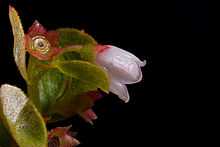Gaylussacia dumosa
| Gaylussacia dumosa | |
|---|---|
 | |
| Conservation status | |
| Scientific classification | |
| Kingdom: | Plantae |
| (unranked): | Angiosperms |
| (unranked): | Eudicots |
| (unranked): | Asterids |
| Order: | Ericales |
| Family: | Ericaceae |
| Genus: | Gaylussacia |
| Species: | G. dumosa |
| Binomial name | |
| Gaylussacia dumosa (Andrews) Torr. & A.Gray | |
| Synonyms[1] | |
| |
Gaylussacia dumosa is a species of flowering plant in the heath family known by the common names dwarf huckleberry, bush huckleberry, and gopherberry. It is native to eastern North America from Newfoundland to Mississippi and Florida. It occurs along the coastal plain and in the mountains.[2]
This shrub branches from the base and grows erect to a maximum height around 75 centimeters. It grows from a rhizome. The young twigs are coated in curly hairs. The deciduous leaves are oval in shape, leathery, and glandular. The inflorescence is a raceme of bell-shaped flowers. The fruit is a berry. The plant reproduces by seed and by sprouting from the rhizome. It sprouts readily after episodes of wildfire.[2]
This plant grows in dry or moist habitat types. It can be found in forests, pine barrens, pine flatwoods, bogs, and bays. It grows alongside plants such as eastern red cedar (Juniperus virginiana), tamarack (Larix laricina), redbay (Persea borbonia), sweetbay (Magnolia virginiana), flowering dogwood (Cornus florida), dangleberry (Gaylussacia frondosa), yaupon (Ilex vomitoria), fetterbush (Leucothoe racemosa), and blueberry (Vaccinium spp.).[2]
References
- ↑ "Gaylussacia dumosa (Andrews) Torr. & A.Gray". The Plant List; Version 1. (published on the internet). Royal Botanic Gardens, Kew and Missouri Botanical Garden. 2010. Retrieved January 10, 2012.
- ↑ 2.0 2.1 2.2 Coladonato, Milo 1992. Gaylussacia dumosa. In: Fire Effects Information System, [Online]. U.S. Department of Agriculture, Forest Service, Rocky Mountain Research Station, Fire Sciences Laboratory.
